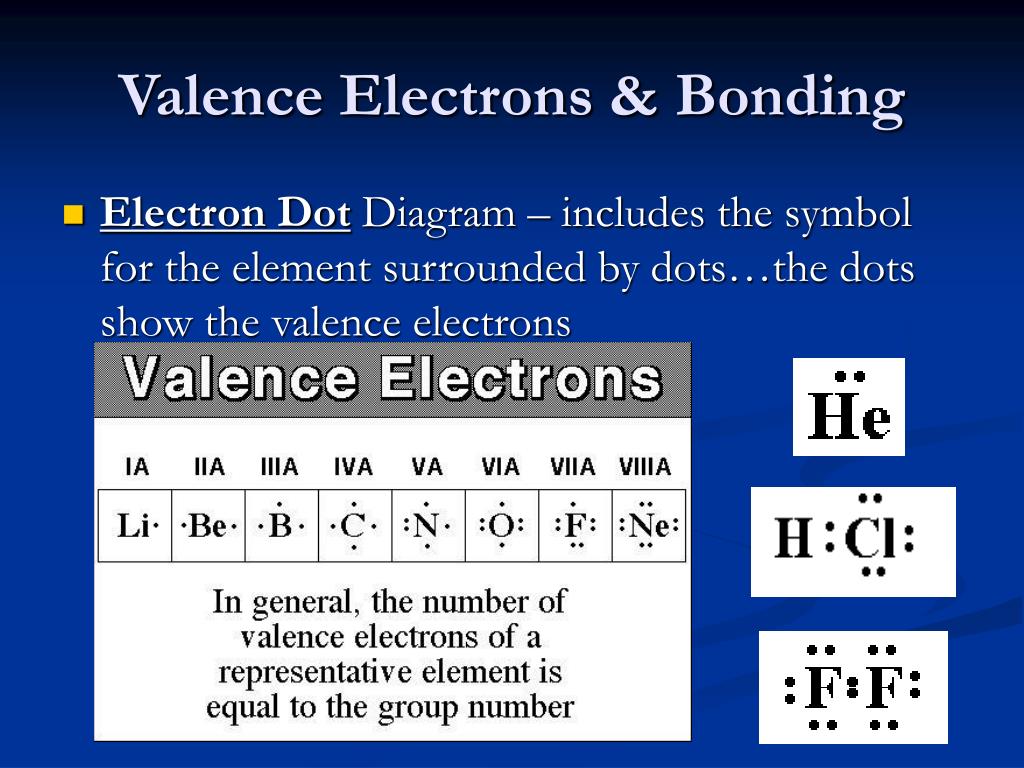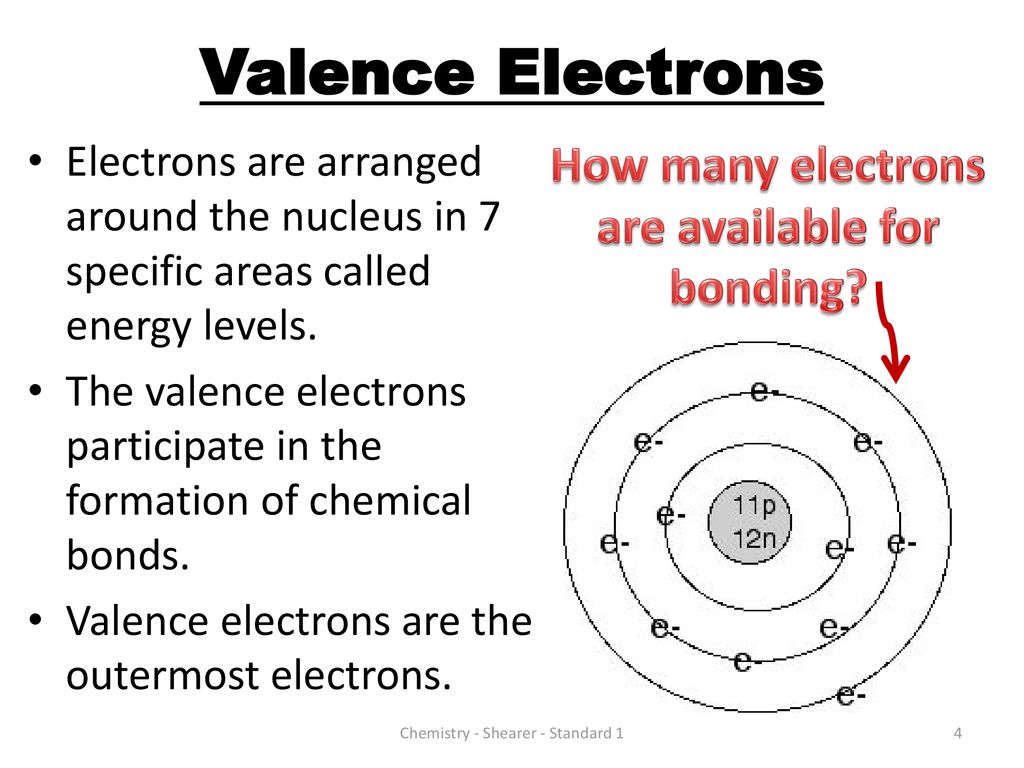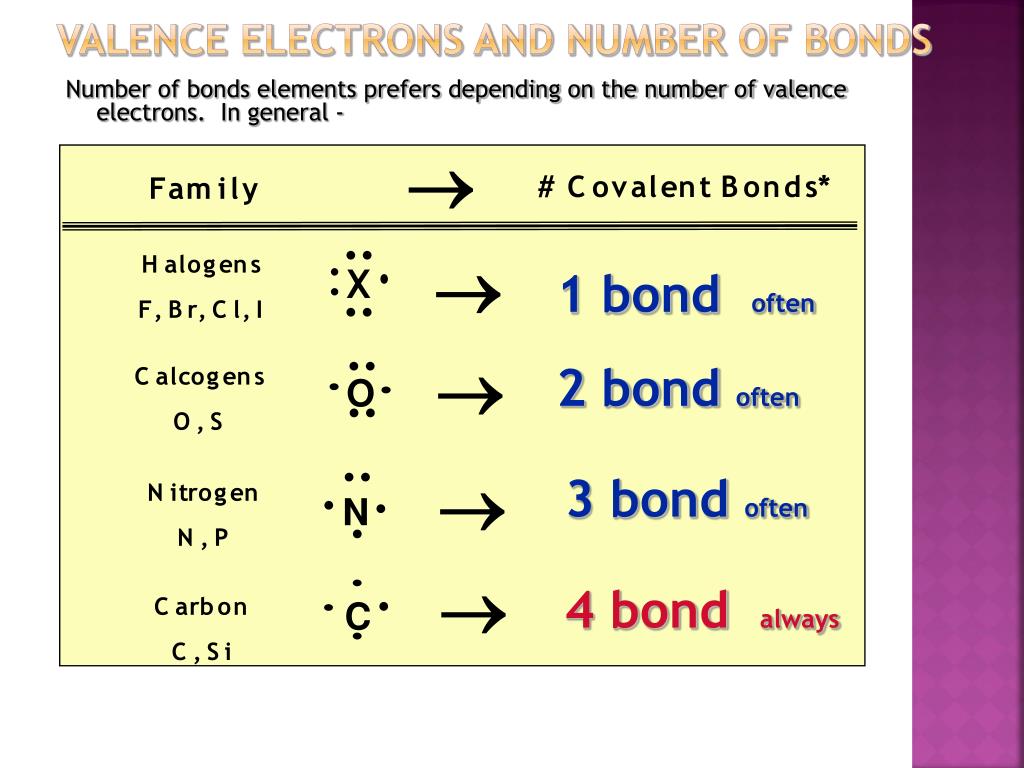Which Element Has The Fewest Valence Electrons Available For Bonding - This is typical for elements in group. Sodium (na) with atomic number 11 has the least number of valence electrons. Aluminum (al) has 3 valence electrons. Iodine (i) has 7 valence electrons. Nitrogen (n) has 5 valence electrons. Carbon (c) has 4 valence electrons. A) iodine b) aluminum c) carbon d) nitrogen The element with the fewest valence electrons available for bonding is lithium (li), located in group 1, which has 1 valence. Which element has the fewest valence electrons available for bonding? Thus, aluminum (al) has the fewest valence electrons, with only 3 available for bonding.
Aluminum (al) has 3 valence electrons. This is typical for elements in group. Iodine (i) has 7 valence electrons. A) iodine b) aluminum c) carbon d) nitrogen The element with the fewest valence electrons available for bonding is lithium (li), located in group 1, which has 1 valence. Which element has the fewest valence electrons available for bonding? Thus, aluminum (al) has the fewest valence electrons, with only 3 available for bonding. The total number of electrons present in the outer. Carbon (c) has 4 valence electrons. Nitrogen (n) has 5 valence electrons.
Aluminum (al) has 3 valence electrons. Nitrogen (n) has 5 valence electrons. The total number of electrons present in the outer. Iodine (i) has 7 valence electrons. Thus, aluminum (al) has the fewest valence electrons, with only 3 available for bonding. Sodium (na) with atomic number 11 has the least number of valence electrons. Carbon (c) has 4 valence electrons. The element with the fewest valence electrons available for bonding is lithium (li), located in group 1, which has 1 valence. Which element has the fewest valence electrons available for bonding? A) iodine b) aluminum c) carbon d) nitrogen
PPT Intro to Bonding Part 2 Covalent Compounds (Type 3 Binary
Aluminum (al) has 3 valence electrons. Study with quizlet and memorize flashcards containing terms like how many valence electrons are available for bonding in bromine (br)?,. The total number of electrons present in the outer. Iodine (i) has 7 valence electrons. Sodium (na) with atomic number 11 has the least number of valence electrons.
PPT Chemical Bonding and Molecular Structure PowerPoint Presentation
Nitrogen (n) has 5 valence electrons. This is typical for elements in group. Iodine (i) has 7 valence electrons. The total number of electrons present in the outer. Carbon (c) has 4 valence electrons.
PPT Chapter 5 Atoms & Bonding PowerPoint Presentation, free
Thus, aluminum (al) has the fewest valence electrons, with only 3 available for bonding. A) iodine b) aluminum c) carbon d) nitrogen Iodine (i) has 7 valence electrons. The total number of electrons present in the outer. This is typical for elements in group.
Chemistry Shearer Standard 1 ppt download
This is typical for elements in group. Nitrogen (n) has 5 valence electrons. Aluminum (al) has 3 valence electrons. Iodine (i) has 7 valence electrons. Which element has the fewest valence electrons available for bonding?
PPT Bonding PowerPoint Presentation, free download ID6281432
Thus, aluminum (al) has the fewest valence electrons, with only 3 available for bonding. Iodine (i) has 7 valence electrons. Aluminum (al) has 3 valence electrons. Nitrogen (n) has 5 valence electrons. A) iodine b) aluminum c) carbon d) nitrogen
[Solved] QUESTION 43 Which element has the fewest valence electrons? H
Sodium (na) with atomic number 11 has the least number of valence electrons. Iodine (i) has 7 valence electrons. Which element has the fewest valence electrons available for bonding? Aluminum (al) has 3 valence electrons. Study with quizlet and memorize flashcards containing terms like how many valence electrons are available for bonding in bromine (br)?,.
PPT Drawing Lewis Structures A Tutorial on Writing Lewis Dot
Study with quizlet and memorize flashcards containing terms like how many valence electrons are available for bonding in bromine (br)?,. Thus, aluminum (al) has the fewest valence electrons, with only 3 available for bonding. Which element has the fewest valence electrons available for bonding? This is typical for elements in group. The total number of electrons present in the outer.
Lesson 3 Bonding & the Periodic Table Diagram Quizlet
Aluminum (al) has 3 valence electrons. Sodium (na) with atomic number 11 has the least number of valence electrons. Which element has the fewest valence electrons available for bonding? Iodine (i) has 7 valence electrons. Carbon (c) has 4 valence electrons.
Elements and Chemical Bonds
Thus, aluminum (al) has the fewest valence electrons, with only 3 available for bonding. A) iodine b) aluminum c) carbon d) nitrogen The element with the fewest valence electrons available for bonding is lithium (li), located in group 1, which has 1 valence. Nitrogen (n) has 5 valence electrons. Sodium (na) with atomic number 11 has the least number of.
Valence Electrons ELECTRONS AVAILABLE FOR BONDING CA Standards
The element with the fewest valence electrons available for bonding is lithium (li), located in group 1, which has 1 valence. Iodine (i) has 7 valence electrons. This is typical for elements in group. Thus, aluminum (al) has the fewest valence electrons, with only 3 available for bonding. The total number of electrons present in the outer.
This Is Typical For Elements In Group.
Carbon (c) has 4 valence electrons. Thus, aluminum (al) has the fewest valence electrons, with only 3 available for bonding. The total number of electrons present in the outer. Aluminum (al) has 3 valence electrons.
A) Iodine B) Aluminum C) Carbon D) Nitrogen
Sodium (na) with atomic number 11 has the least number of valence electrons. Nitrogen (n) has 5 valence electrons. Iodine (i) has 7 valence electrons. Which element has the fewest valence electrons available for bonding?
Study With Quizlet And Memorize Flashcards Containing Terms Like How Many Valence Electrons Are Available For Bonding In Bromine (Br)?,.
The element with the fewest valence electrons available for bonding is lithium (li), located in group 1, which has 1 valence.








